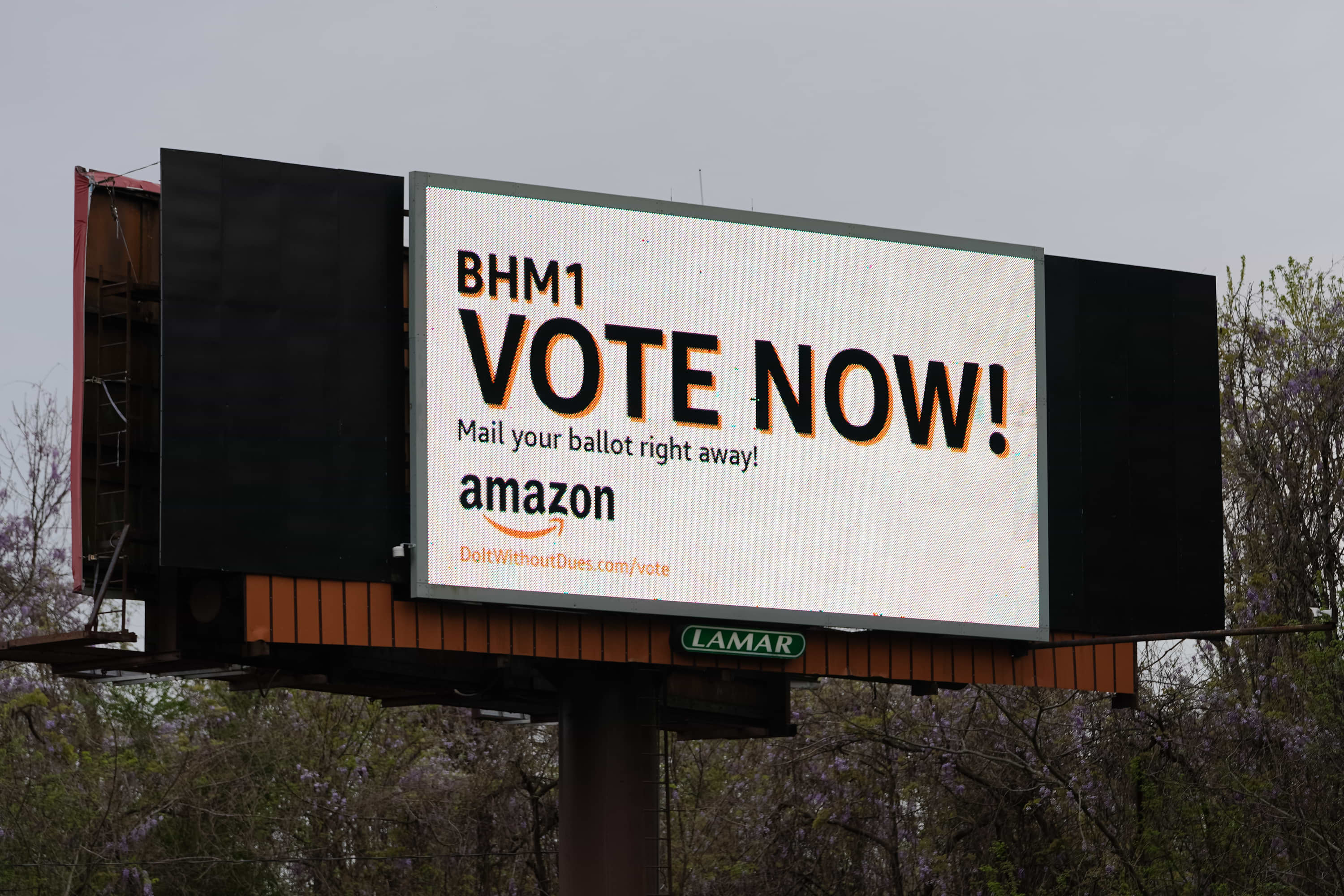
Amazon repeatedly engaged in illegal conduct that prevented a “free and fair” union election at one of its Alabama warehouses, the union leading the campaign alleges.
The Retail, Wholesale and Department Store Union late Friday filed objections to the National Labor Relations Board, accusing Amazon of interfering in the closely watched union campaign held earlier this month at the company’s Bessemer, Alabama, warehouse. Bessemer employees overwhelmingly rejected unionization, with fewer than 30% of the votes tallied in favor of joining the RWDSU.
Labor unions have organized some of Amazon’s European workforce, but no U.S. facility has successfully formed or joined a union.
In its filing submitted to the NLRB, the union listed 23 objections surrounding Amazon’s behavior during the monthslong campaign, including allegations of employee intimidation and manipulation. The RWDSU said Monday it has requested a hearing before the NLRB to discuss its objections.
“The objections constitute conduct which prevented a free and uncoerced exercise of choice by the employees, undermining the board’s efforts to provide ‘a laboratory in which an experiment may be conducted, under conditions as nearly as ideal as possible, to determine the uninhibited desires of the employees,'” the RWDSU said Monday.
Amazon spokeswoman Heather Knox told CNBC in a statement: “The fact is that less than 16% of employees at BHM1 voted to join a union. Rather than accepting these employees’ choice, the union seems determined to continue misrepresenting the facts in order to drive its own agenda. We look forward to the next steps in the legal process.”
The NLRB declined to comment.
The union outlined a range of objections in its filing, including claims that Amazon interrogated and fired a pro-union employee for passing out union authorization cards in nonwork areas, which is a protected right under federal labor law; removed employees from mandatory meetings who asked questions; and disciplined an “outspoken supporter of the union” after he challenged Amazon in mandatory meetings.
The union alleges in the filing that Amazon sent multiple messages to workers threatening widespread layoffs and even possibly closing the facility if they voted for the union. Additionally, Amazon told workers that voting for the union could lead to a loss of benefits and potentially their pay rate, particularly if the union decides to go on strike, the RWDSU said. Two Bessemer employees previously told CNBC that Amazon had threatened loss of benefits and pay if the union were voted in.
Several of these actions had a “chilling effect on support for the union,” the RWDSU said.
Amazon previously told CNBC that it held mandatory meetings with workers to inform them of all the potential outcomes that could arise from collective bargaining negotiations. Amazon said it highlighted that the union could possibly call for a strike, since it’s the union’s main leverage over an employer.
Beyond claims of coercion and intimidation, the union argues that Amazon tainted the election by installing a mailbox in the parking lot outside the warehouse.
During the seven-week mail-in election, Amazon directed employees to submit their ballots via the mailbox, with a sign on a tent surrounding it reading, “Speak for yourself! Mail your ballot here.” Emails obtained by the RWDSU via a Freedom of Information Act request showed Amazon pressured the U.S. Postal Service to place the mailbox outside the facility in the weeks leading up to the vote.
The RWDSU alleges that the mailbox sowed confusion among employees by suggesting that Amazon was involved in collecting and counting votes. Additionally, the mailbox may have created the impression of surveillance, as it was in full view of security cameras in the parking lot, which “could record the employees entering and exiting the tent erected around the collection box to cast ballots,” the union claims.
The RWDSU argues that Amazon’s decision to install a mailbox was in violation of an NLRB order. It also claims the mailbox “destroyed” what the NLRB calls “laboratory conditions,” or the environment necessary for employees to freely cast their vote in an election, and could amount to unlawful ballot harvesting.
The objections mark the beginning of what could end up being a long road of legal challenges for Amazon and the RWDSU.
The NLRB’s regional director will likely schedule a hearing in coming weeks to review the objections, where both sides can present evidence. Depending on the results of an investigation, the regional director could decide that Amazon’s conduct was so egregious that the results of the election should be thrown out.
Either party can appeal the regional director’s ruling to the NLRB board in Washington. The board could order a new election, or if the board finds that the conduct was extraordinarily egregious, it could order Amazon to bargain with the union.





































